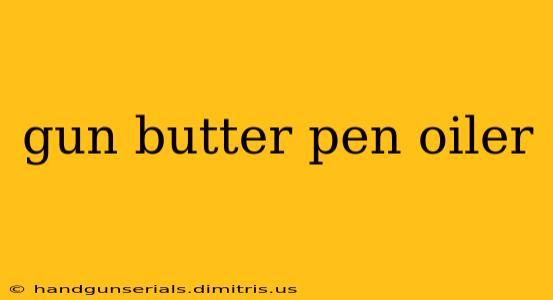Choosing the right lubricant for your firearms is crucial for maintaining optimal performance and extending their lifespan. Two popular choices often top the list: Gun Butter and various penetrating oils. But which one truly reigns supreme? This in-depth comparison will help you make an informed decision based on your specific needs and firearm type.
Understanding Gun Butter
Gun Butter is a popular firearm lubricant known for its thick, paste-like consistency. This heavy-duty lubricant is designed to cling to metal surfaces, providing long-lasting protection against wear and tear, even under extreme conditions. Its thick nature makes it ideal for applications where a long-lasting, protective barrier is needed. Key features often highlighted by users include:
- Superior Protection: Forms a durable, protective layer that resists washing away, even after exposure to moisture or harsh conditions.
- Long-lasting Lubrication: Its thick consistency ensures long-term lubrication, reducing the frequency of reapplication.
- Corrosion Resistance: Helps protect metal parts from rust and corrosion, crucial for maintaining firearm longevity.
- Easy Application: While thick, Gun Butter is generally easy to apply and spread, though it may require more effort than thinner oils.
When to Use Gun Butter
Gun Butter shines in situations requiring robust, long-term lubrication and protection. It's particularly well-suited for:
- Storage: Ideal for long-term firearm storage, providing excellent protection against rust and corrosion during periods of inactivity.
- Extreme Conditions: Its thick consistency helps it withstand harsh conditions, making it suitable for use in environments with extreme temperatures or high humidity.
- High-Stress Applications: For firearms subjected to intense use or recoil, Gun Butter offers superior protection against wear.
Exploring Penetrating Oils
Penetrating oils, in contrast to Gun Butter, are thin and designed to seep into tight spaces, displacing moisture and freeing up stuck or seized parts. They are often used for cleaning and maintenance tasks rather than long-term lubrication. Common characteristics include:
- Superior Penetration: Able to penetrate deep into tight crevices and mechanisms, freeing up stuck parts and displacing moisture.
- Cleaning Properties: Many penetrating oils have cleaning agents that help remove dirt, grime, and debris.
- Rust Prevention: While not as durable as Gun Butter's protective layer, penetrating oils offer some level of rust prevention.
- Faster Application: Their thin consistency makes application quick and easy.
When to Use Penetrating Oils
Penetrating oils are best utilized for:
- Cleaning: Effective for removing dirt, grime, and other contaminants from firearm components.
- Freeing Stuck Parts: Excellent for loosening stuck or seized parts, making them easier to operate.
- Initial Lubrication (short term): While not ideal for long-term protection, they can provide temporary lubrication before applying a more durable lubricant.
Gun Butter vs. Penetrating Oil: The Verdict
The choice between Gun Butter and penetrating oil depends largely on your specific needs. Gun Butter excels in providing long-term protection and lubrication, particularly in harsh conditions or during storage. Penetrating oils are better suited for cleaning, freeing up stuck parts, and providing temporary lubrication.
Many firearm enthusiasts utilize both products as part of their regular maintenance routine, using penetrating oil for cleaning and initial lubrication, followed by Gun Butter for long-term protection. This approach combines the benefits of both types of lubricants, maximizing firearm lifespan and performance.
Remember to always consult your firearm's owner's manual for specific lubrication recommendations. Proper lubrication is a critical aspect of firearm maintenance; choosing the right lubricant ensures your firearms function reliably and safely for years to come.

